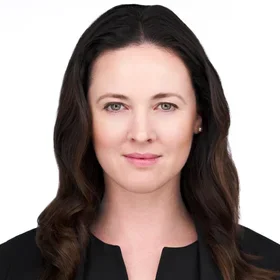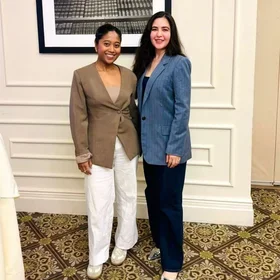Kimberly Tableman (M.S. in Information and Knowledge Strategy, ’13) sought a graduate program that she felt would be leading edge, but that would also introduce her to like-minded professionals and accommodate her demanding work schedule as the Director of Core Process and Technology at Pfizer.
She discovered the M.S. in Information and Knowledge Strategy (IKNS) program at Columbia University. "So many organizations are trying to figure out how to respond to the abundance of data," she says, and she enrolled in the program to learn about "capturing appropriate attributes about the data, structuring the data, and generally making it a competitive advantage." Kimberly also relished the opportunity to expand her network: “I was looking for a high-quality program where I was going to meet high-caliber people who were interesting and passionate, and who brought different perspectives to the table.”
“My career path is to the Chief Information Officer (CIO) office,” she says. “That’s my aspiration.” Thanks to the lessons from IKNS, Kimberly’s thinking differently about how to provide leadership in the information and knowledge strategy space: “When you look at a knowledge management program and are trying to change a culture, you have to take a bigger-picture, strategic view.” She tells Columbia that, inspired by her capstone project where she worked for a CIO, she’s rethinking business process flows and how to structure projects in order to better facilitate knowledge sharing. “Where's the motivation?” she says. “You have to create a culture in which people feel compelled to collaborate.”
Can you tell me about your current role and how IKNS fits in?
I work for Pfizer, which has 75,000 employees globally, and produces about $50 billion in revenue per year. In the time period that I have been there, we went from building a lot of applications to buying a lot of commercial, off-the-shelf products. What we're left with now is a hodgepodge of applications, each producing data and information. We’re asking ourselves: what do we do with all this data, and how do we serve it up to people in a meaningful way?
I'm curious what drew you to this kind of work in the first place.
I started my career in consulting at CapGemini Ernst & Young in 2000. My passion for knowledge management really started then, because one of the things that consulting companies do exceptionally well is knowledge reuse.
Whenever I started a new project, I would fly to whatever client site I had to go to. Depending on the project I was working on, I could literally go to my internal knowledge web, click on the relevant subject – for instance, "telecommunications customer relationship management." I would get hundreds of knowledge artifacts.
Basically, I was a 22-year-old kid who was able to add value to these organizations immediately. There was no competitive information in those knowledge artifacts; they had been cleansed. But what that system did was allow me to ramp up on these projects very quickly. We're making strides in that direction at Pfizer.
How did you balance work, family, and school when you were in the IKNS master’s program?
That's my favorite question. I started the program when I was 36, and I had a six-year-old and an eight-year-old. I was also working full-time. I had a strategy around time management. On the weekends, I would either take the kids to a local trampoline park, and they would literally be jumping for two hours while I was writing my papers, or I would take my daughter to the library. She would sit and read her book while I was finishing my coursework.
I incorporated my children into the process. I wasn't putting them aside.
You brought in the stakeholders – your family.
Exactly.
Any last thought about IKNS or your Columbia experience overall?
I loved the program. I certainly feel like I got everything I wanted to get out of it, and then some. While the program is very well done, I would also say that the friendships that I made in that program were equally valuable. The relationships that you build are well worth the investment of time.


